How Does Anxiety Affect The Body - 11 Effects On The Body And Ways To Fight It.
WhatToGetMy Instructional Article
- Anxiety disorders are the reality to millions of people around the world as shown by this graph from Statista.
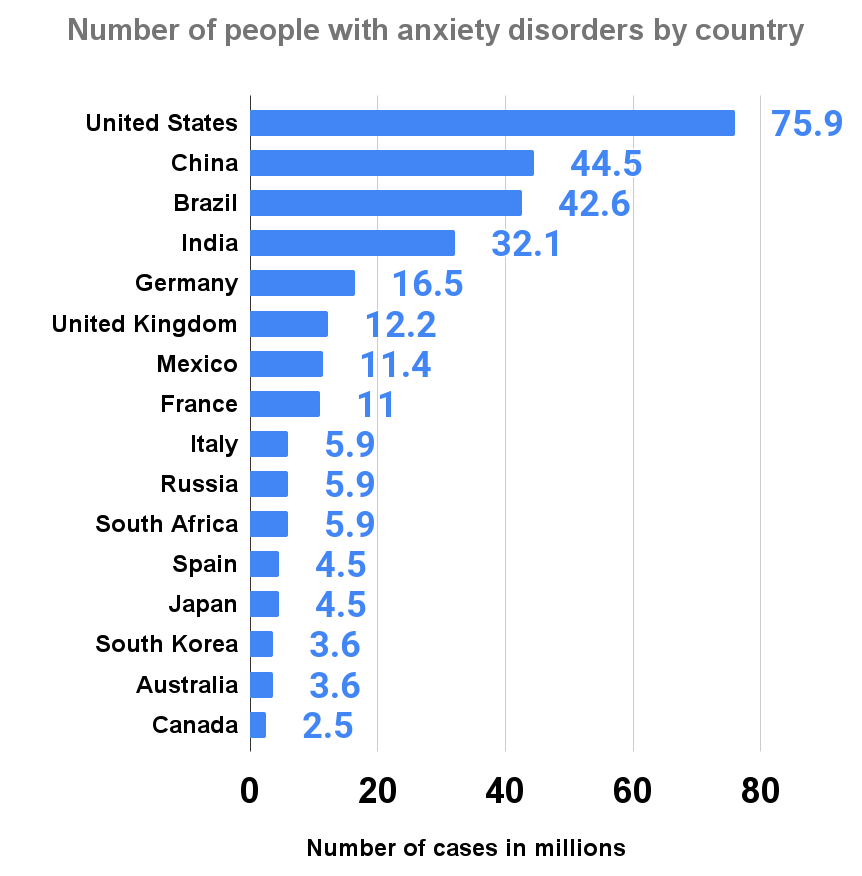
- Anxiety is quite problematic because it not only affects us mentally but physically as well.
- These physical effects need to be catered to because if left untreated, they can develop into serious conditions that might seriously threaten our health.
People usually consider anxiety to be a mental health issue and so rarely ever ask the question, “how does anxiety affect the body?” The truth is that there are many negative effects of anxiety on the body with varying levels of severity depending on the type of anxiety one has.
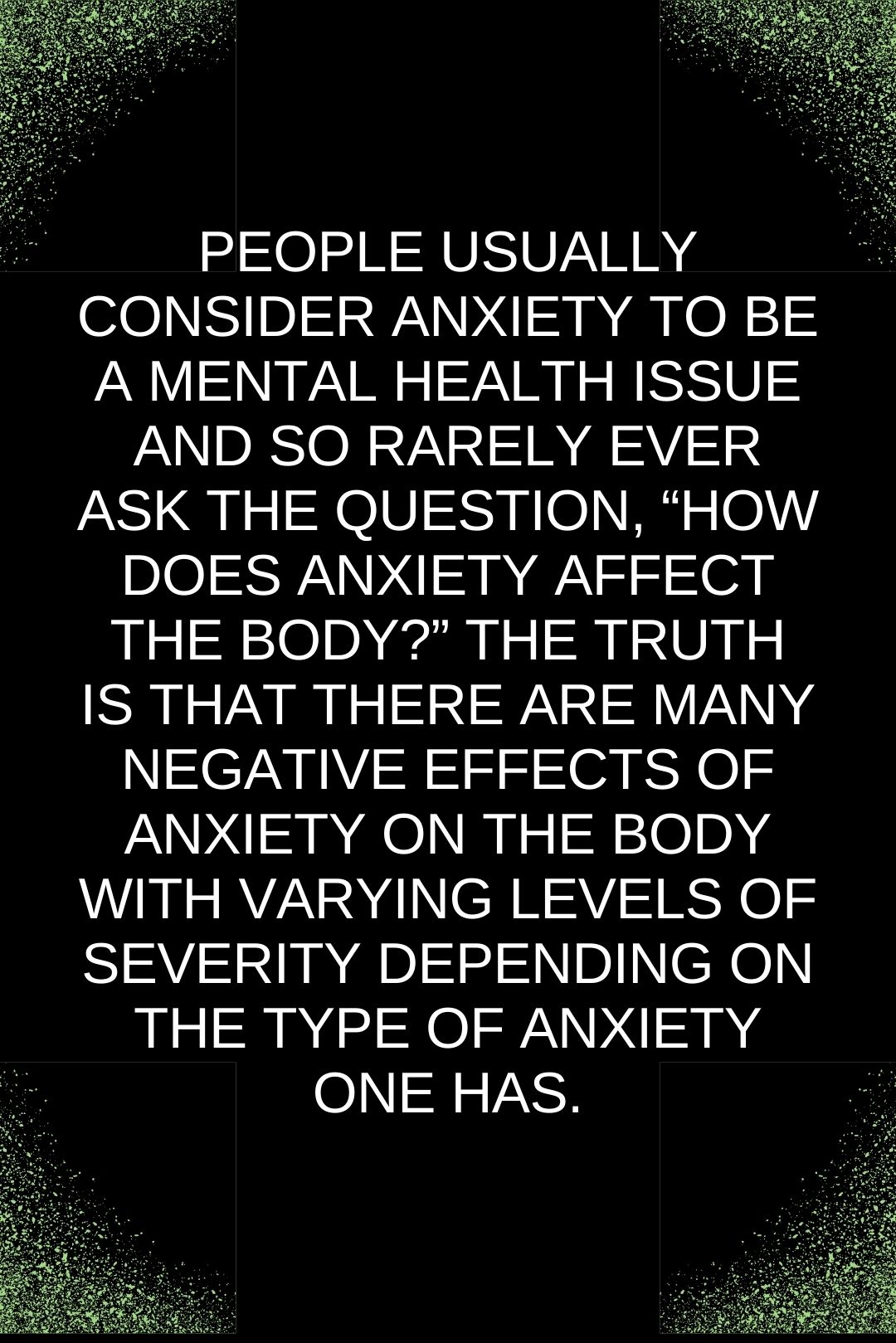
Anxiety is generally not very harmful in the short run but when it persists, it can lead to problems with the way the body’s systems work. This is why there are various physiological effects of anxiety.
For instance, the results of anxiety include problems with your heart, brain, immune system, and many more. To avoid these anxiety health issues, you need to attack the anxiety itself and thankfully, there is treatment for anxiety to ensure you can live as normal a life as possible.
How does anxiety manifest itself and do I have an anxiety disorder? If you are unsure of the answer to this question, here are the various types of anxiety there are:
Agoraphobia
This refers to fearing or feeling anxious about certain situations and environments that may trigger a panic attack or embarrassment because one might have felt those things in similar situations. It is therefore both a type of anxiety and an anxiety effect on the brain.
Panic Attacks Disorder
This refers to suddenly feeling so anxious that you get a panic attack. This happens over and over and because one lives in fear of the next attack, this type of anxiety affects your daily life immensely.
Social phobia
This is a feeling of anxiousness when in social settings. One experiences intense fear or shame owing to a belief that they might be judged negatively by those they are interacting with.
Generalized Anxiety Disorder (GAD)
A person with GAD gets anxious over many different situations and as a result, is usually on edge. This leads to the brain constantly flooding the body with stress hormones such that this condition becomes long-term.
Post-traumatic stress disorder (PTSD)
As a result of having experienced a traumatic event or a series of them, this anxiety disorder develops and will see the person constantly reliving the event in their mind such that they will feel very anxious in person.
Separation Anxiety Disorder
A person with this disorder will generally be scared or worried about a loved one leaving them. While it is most often seen in children, it can be present in adults too when they have a fear of a loved one being harmed when they leave the person.
Obsessive-Compulsive Disorder (OCD)
This type of anxiety forces a person to keep thinking about a certain thought in an obsessive manner that forces the person to engage in repeated activities to satisfy that thought. For instance, repeating certain phrases, constantly checking the door to see if it is closed, and arranging things in a certain way amongst others.
If you feel that you have any of these, you need to get help because you might be at risk of any of the following health problems:
Related article: Signs of Shame in a Person.
8 Health effects of Anxiety.
Table of Contents
1. Muscular Issues
One of the health effects of anxiety is the effect it has on the muscles. During a stressful situation, the muscles tense in anticipation of movement. When a person is constantly anxious however, the brain will keep flooding the body with stress hormones thereby forcing the muscles to remain tense.
This can lead to exhaustion, muscle aches, pain, and muscle stiffness that could then evolve into chronic pain conditions such as arthritis. If you needed an answer to the question, “Can anxiety hurt you?” The answer is yes, being anxious affects your body immensely.
2. Respiratory issues
Anxiety interferes with life in the form of respiratory attacks. A person that is experiencing an anxiety disorder will usually have shortness of breath owing to the body trying to acquire more oxygen to pump more blood to deal with the stressful situation at hand.
The consequence of anxiety in this regard is that if you have respiratory issues such as asthma and COPD, there is a chance that they will get worse.
3. Immune system issues
There is a link between anxiety and immune system issues in that anxiety makes the body more prone to illness. This is because a body that is constantly stressed and on edge will not be able to properly carry out its functions including those of the immune system.
With the immune system not functioning well, the body will have increased exposure to illness. Anxiety and its effects are therefore quite extensive.
4. Heart issues
Anxiety affects your health in many ways and one of those is by attacking the heart. This happens because anxiety triggers the release of hormones such as adrenaline and cortisol which make the heart beat faster. When this continues to happen, the pattern of a person’s heartbeat can change for the worse.
Anxiety effects on hearts include palpitations, high blood pressure, heart disease, a racing heart, an irregular heartbeat, and an increased risk of heart attacks.
5. Gastrointestinal issues
One of the most noticeable effects of anxiety on the body is the effect it has on the gastrointestinal system. When you constantly feel anxious, the body’s digestive processes are heavily impacted for the worst such that you develop a host of gastrointestinal issues.
Some of these anxiety health problems include diarrhea, vomiting, constipation, stomach pains, constantly feeling bloated, and an increased risk of Irritable Bowel Syndrome.
6. Problems with weight control
Another anxiety effect on the body is the havoc it brings upon the body’s cholesterol levels and its general weight. Research has shown that one of the side effects of anxiety and stress is that the body is directed to seek certain foods which are high in sugar to meet the energy demands of the body to fight off the stress.
This will then lead to the body’s blood sugar levels constantly fluctuating and to combat this, the body will crave food that is high in salt. As this cycle repeats itself, it can lead to increased cholesterol and weight levels. A side effect of anxiety attacks, therefore, is that one might become obese.
7. Insomnia and issues with sleep
Another answer to the question, “How does anxiety affect the body?” is that it can mess with your sleeping patterns. You see, when you are anxious, the stress hormones that are released by the body prevent you from sleeping or resting because the body will be in an emergency state of fight or flight.
Another after-effect of an anxiety attack is that your thoughts might be all over the place and this alone will prevent you from being able to sleep as well as you want.
Related article: Gifts to help sleep better.
8. Nervous system issues
Can extreme anxiety cause neurological symptoms? The answer is a resounding yes. As the organ at the forefront of the body’s response to stress, the brain is very much impacted by anxiety such that there are several brain anxiety symptoms and effects.
First off, sustained anxiety, especially in the form of anxiety disorders, leads to the brain becoming hyperactive in its dealings with stress. The amygdala will become so enlarged that it begins to send false signals because of heightened sensitivity.
Anxiety also reduces your brain’s ability to be more rational because anxiety leads to a weaker connection between the amygdala and the prefrontal cortex. This also limits your ability to focus for long periods.
One of the worst effects of anxiety on the brain is its effect on memory. Anxiety shrinks the hippocampus which is responsible for memory thereby resulting in memory loss. What is even more disturbing is that the memories that are lost are the good and happy ones whilst the ones that are left unscathed are those that will trigger even more anxiety.
This is what might happen when you are nervous and anxious all the time and why you must seek help as soon as you can.
3 Ways of Treating Anxiety.
9. Lifestyle changes
Can anxiety ruin your life? Not if you take steps to combat it. There are several lifestyle changes you could make to try to live with and overcome anxiety that are all-natural and recommended by medical professionals.
Some of these ways include; sleeping and resting more often, exercising and eating well so that the body gets all the required nutrients to function efficiently, avoiding substances like alcohol, cigarettes, and caffeine as these could exacerbate anxiety.
Related article: Foods to eat to remain healthy and How we can protect our health.
10. Engage in community service
As a result of several research proving the efficacy of this method, several health experts recommend that one engage in an activity that involves helping others such as volunteering in soup kitchens or joining the neighborhood watch.
The reason for this is that helping others releases hormones that make you feel calmer and happier with yourself such that anxiety reduces. It will also increase the social connections you have which can help fight anxiety as well.
11. Talking to a doctor
Anxiety disorders are now a recognized medical issue which means that you can talk to your doctor about them. They can administer tests to find out if you have anxiety. If they find that you have moderate to severe anxiety, they can recommend either psychotherapy or medication to help you out.
Bottom line, there is help for you. Feel free to visit a doctor to ask them any questions you might have about anxiety such as, “is anxiety permanent?” and “how does generalized anxiety disorder affect your life?”. The answer to the latter question is the effects listed in this article but a doctor would be able to give more in-depth explanations. As for the former, anxiety disorders do not completely go away but they can be treated such that they are barely a factor anymore.
Frequently Asked Questions
1. What physical symptoms can anxiety cause?
How does anxiety affect the body?
- It can lead to muscle tensions and muscle pain
- It can instigate respiratory issues
- It can cause heart issues such as heart palpitations and heart disease
- It can lead to digestive problems in the gastrointestinal tract
- A person is at increased risk of weight gains and problems with high cholesterol
2. What parts of the body are affected by anxiety?
The parts of the body affected by anxiety include:
- The brain
- The heart
- The digestive tract
- The muscles
- The lungs
3. What are four possible physical symptoms of anxiety?
- Reduced immunity to diseases
- Increase risk of heart problems
- Problems with digestion such as constipation and feeling bloated
- Problems with breathing that can exacerbate pre-existing conditions such as asthma.
4. How does anxiety affect you mentally?
Anxiety disorders have been known to lead to depression. It can also mess with a person’s thoughts, general behavior, and temperament such that they will become more socially withdrawn and isolated. Anxiety can also make a person worry much more than they normally would even about seemingly mundane situations.
In conclusion
What does anxiety do to your body? Quite a whole lot. It can affect everything from your heart to your muscles and gastrointestinal system to your immune system and even the brain. Not taking anxiety seriously can therefore be quite detrimental to your survival. If you feel you have an anxiety disorder, do reach out to a medical professional as soon as you can so that you can be spared the negative physical effects of anxiety.
54 MINUTES
ESTIMATED TIME DESIGNING AND UPLOADING THIS ARTICLE
10 HOURS 26 MINUTES
ESTIMATED TIME RESEARCHING AND WRITING THIS ARTICLE
You Might Also Like

7 Ways on How to Explain Anxiety to Your Partner
17 Things to Do with Toddlers on Long Island WhatToGetMy Instructional Article If you have ever wondered how to explain anxiety to your partner, then this article is for you. It can be quite tricky to talk about anxiety with your partner especially when the
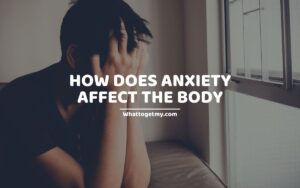
How Does Anxiety Affect the Body – 11 Effects on the Body and Ways to Fight It
How Does Anxiety Affect The Body – 11 Effects On The Body And Ways To Fight It. WhatToGetMy Instructional Article Anxiety disorders are the reality to millions of people around the world as shown by this graph from Statista. Anxiety is quite problematic because it

15 Smart Things to Say when Someone Insults You
15 Smart Things to Say when Someone Insults You WhatToGetMy Instructional Article DEALING WITH INSULTS Insults are a hard blow to our self-esteem and self-worth especially when we are forced to hear them regularly, which can lead to unhappiness and occasionally depression. People who insult

9 Ways on How to Be in a Relationship With Someone Who Has Anxiety
9 Ways on How to Be in a Relationship With Someone Who Has Anxiety WhatToGetMy Instructional Article Ever wonder how to be in a relationship with someone who has anxiety? Do you know feel somehow whenever you wait for someone to text you back? Well,
![WHAT [NOT] TO SAY TO SOMEONE WITH ANXIETY](https://whattogetmy.com/wp-content/uploads/2021/01/WHAT-NOT-TO-SAY-TO-SOMEONE-WITH-ANXIETY-300x188.jpg)
What to Say to Someone With Anxiety
What to Say to Someone With Anxiety WhatToGetMy Instructional Article Anxiety disorders can be a result of genetics, environmental stress, childhood trauma, or low self-esteem. Often times, a combination of two or more. Anxiety affects people of all ages but is more prevalent in people
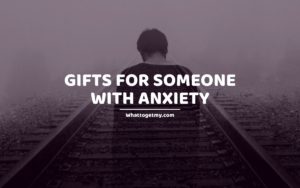
13 Thoughtful Gifts for Someone with Anxiety
When a person is feeling anxious, it means that they are worried about something that is going to happen, or about to happen that is somehow outside of their comfort zone. This feeling goes away once the person has successfully completed whatever task they were
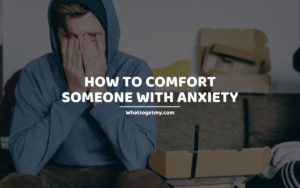
How to Comfort Someone With Anxiety
How to Comfort Someone With Anxiety WhatToGetMy Instructional Article Anxiety is a mental disorder that cripples people with fear and dread, leaving them in a constant state of worry over every aspect of their life. People dealing with anxiety experience discomfort in situations or places

How to Stop Saying Hurtful Things When Angry
How to Stop Saying Hurtful Things When Angry WhatToGetMy Instructional Article Humans are emotional creatures for the most part so most of us say, have said and will say hurtful things to others and chances of this increases significantly when we are angry. For some

21 Warning Signs Of Getting Fired and What You Should Do
Warning Signs Of Getting Fired and What You Should Do WhatToGetMy Instructional Article Some employers will never come out outright to tell you they want to fire you. They will instead resort to scrupulous and underhand tactics and signs they want to fire you. Are

What Does It Mean to Have Low Self Esteem? 23 Facts and Solutions
What Does It Mean to Have Low Self Esteem? WhatToGetMy Instructional Article This article provides in-depth insight on the subject of low self esteem, from the definition of low self esteem to the signs of low self esteem in a man/woman, and dealing with low


